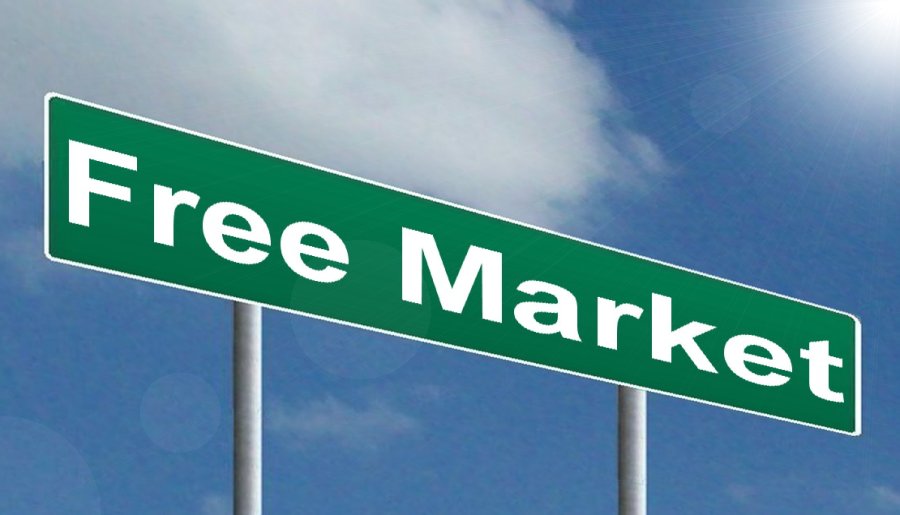
Does capitalism require a state in order to function as a stable, continuous economic system?
Both Republicans and communists say that yes, capitalism requires the backing force of a government--a rare point of agreement between the two political leanings.
I, and many of my fellow voluntaryists, libertarians, anarcho-capitalists, and agorists, disagree. We believe--no, we know beyond a shadow of a doubt--that capitalism can (and would) exist in a free, stateless society, just as it exists today beneath the notice of the modern state.
I would say it boils down to what definition of "capitalism" one uses--that if we could just agree on a definition, we would find the solution to the question. Unfortunately, that is unlikely to happen. So, instead of simply claiming that my definition of capitalism is correct and that all the other ones are wrong because I say so, I'm going to go through a list of commonly used definitions of the word and ask: "If this is what capitalism means, can it exist without a state?"
Note that I am not listing every single possible definition of capitalism in this post. Just the four that I see most commonly referred to. There are others, but I've found that they tend to be mixes of the ones I do list here.
The Garden-Variety Statist Definition of Capitalism
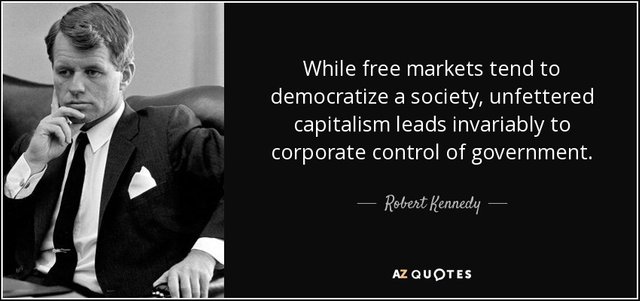
To a centrist of either left or right leanings, capitalism is defined as a political-economic system wherein individuals and businesses are free to exchange goods and services for profit to the extent that the government (guided by the will of the people) allows. The centrist believes that capitalism is a good economic system because it ensures prosperity--but that it needs to be kept in check by a strong government in order to prevent certain societal ills.
Under this definition, capitalism consists of a conglomeration of GOOD ACTORS (honest laborers, mom-and-pop shops), BAD ACTORS (evil profiteers, industrialists, bankers) and noble public servants. The public servants must intervene on behalf of the laborers and mom-and-pops and prevent the evil profiteers from harming the environment or taking too much of the fixed pie of wealth. So the state exists, in this definition, to level the playing field and keep things economically fair. (Although you'll be hard pressed to find a centrist who can name a time when that has actually been done to his or her standards.) When you drill down into this view, you can see that it is a weird hybridization of the Marxist and conservative representations of capitalism.
If this is what capitalism means, then can it exist without a state? Clearly not. The bureaucrat middle-men (our noble public servants) are an indisposable component of this system, and they are extensions of the state, decreeing and enforcing its edicts. Without them, centrists believe, the evil profiteers would destroy the planet and take, take, take from the honest laborers and mom-and-pops until everyone else has to live in destitution while the elites overcharge us for the air we breathe.
The Far Leftist (Marxist) Definition of Capitalism
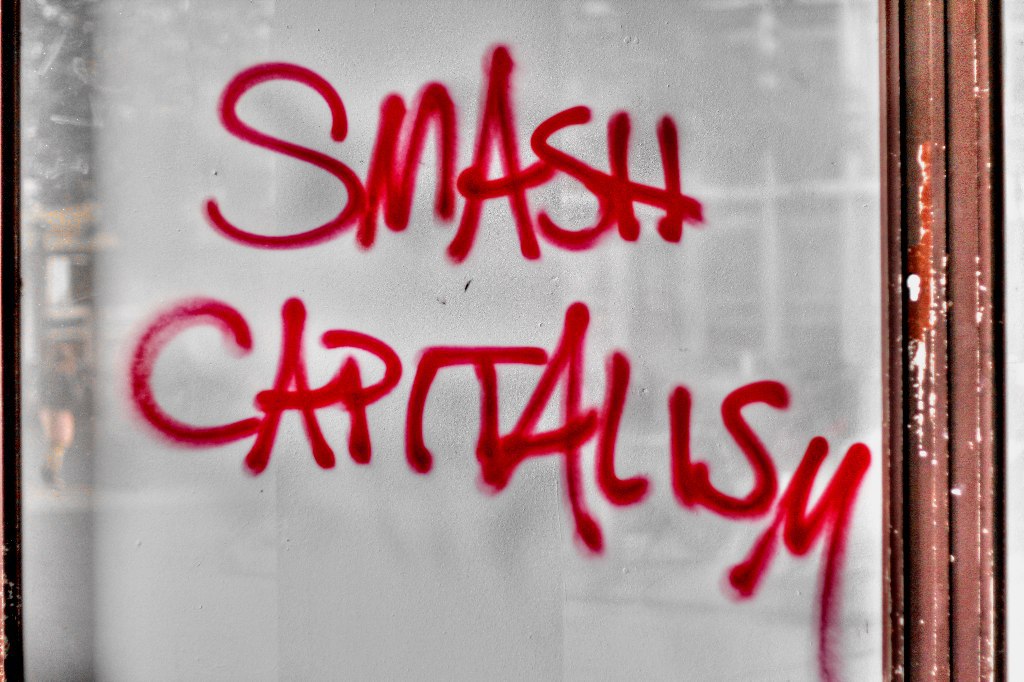
When socialists, communists, and various other leftists use the term "capitalism", they are mainly talking about what they view as economic exploitation. Exploitation of laborers, specifically, but also of other groups and of resources.
In this view, first promulgated by Karl Marx (who also gets credit for popularizing the word "capitalist" as a sort of academic epithet), capitalism is a system of greed and abuse in which the wealthy and the business classes parasitize the poor and the working class. To people following the Marxist definition, anyone who attempts to make a profit on goods and services is taking that profit at the expense of others farther down the economic ladder. Anyone who employs others at a wage less than the amount earned from the product is stealing wages from his or her employees. And anyone who attempts to build capital for the purpose of investment is hoarding wealth and resources that rightfully belong to society. Since "capitalists", or people who exchange goods and services for profit, are greedy and self-centered in this worldview, it stands to reason that they will not stop at exploiting their workers, but will go on to defraud their customers, abuse the poor, and ravage the environment without a second thought.
But unlike centrists, socialists and communists do not see the state as a mitigating factor in all of this greed and abuse perpetrated by capitalism. Instead, they believe that the capitalists rely upon the state as a sort of protection racket for all the exploitation they are doing. For far leftists, the concept of property is the root of the problem. People, they believe, should not be allowed to own property beyond what they can reasonably use, and should never be able to profit from use of their property. All other items beyond what individuals can reasonably use on a daily basis (like their clothes and toothbrush) ought to be considered "communal property", owned commonly by all members of society. Especially things that can be classified as "means of production" rightfully belong to "the workers" as communal property. Furthermore, most items would be considered communal property if only the state wasn't enforcing the notion that people can own things and make a profit from them. In other words, since the state ostensibly protects and enforces property rights for the wealthy, it prevents the workers from rising up and taking what is theirs, thereby perpetuating capitalism.
If this definition of capitalism is true, then can it exist without a state? If you rule out the ability of the capitalists to protect their own property on an individual basis, then no. But that does seem a stretch. It seems more likely in this context that a state would be necessary to wrest control of the property away from the capitalists.
The God-and-Country Conservative View of Capitalism
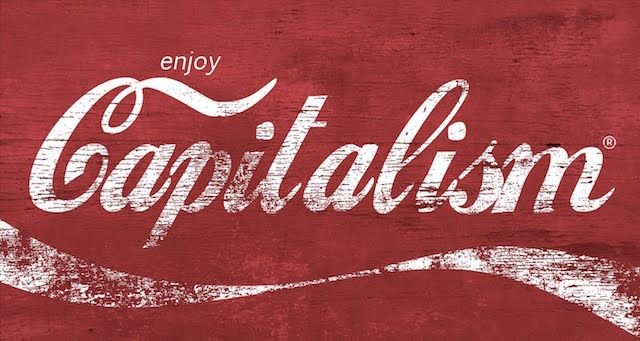
Conservatives (the American kind) view capitalism as an economic system based on free trade that the government ought to keep its nose out of for the most part. Oh, there are always exceptions...like when big companies use free trade to take their jobs offshore where the labor is cheaper, or when immigrants enter the country seeking to take advantage of the free trade to better their own lots in life. In those cases, and a few others, the conservative believes the state ought to intervene for the "good of the economy". But other than that, it ought to leave the markets alone.
But even in a world where job exportation and immigrant importation were not concerns, the conservative view of capitalism still hinges on the power of the state. That's because conservatives (like all statists, including centrists and socialists alike) believe that there are things a government must provide for its citizens. Things like schools. Roads. Military defense. And in order to provide those things, the government must have the power to tax. And how can the government obtain these taxes except by extracting them from the profits of businesspeople and the wages of employees? Taxation in and of itself is a state intervention into the marketplace, and since society can't be run properly without certain tax-funded initiatives, even in the "free market" conservative worldview, capitalism could not exist without a state.
The voluntaryist/anarcho-capitalist/libertarian Definition of Capitalism
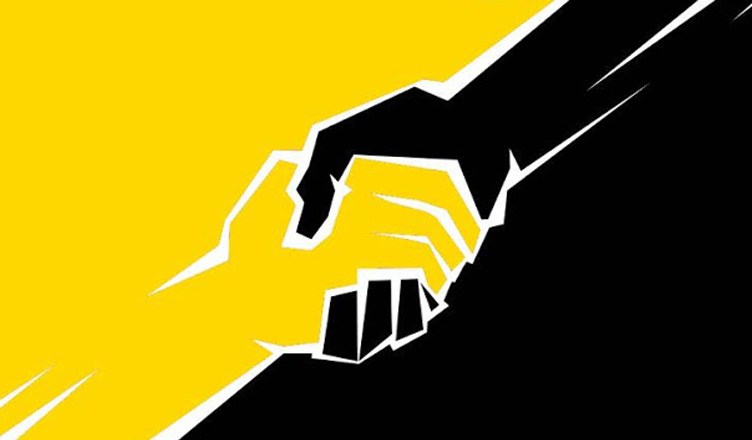
In this view, capitalism is purely and simply: an economic system in which property, trade, industry, and currency are controlled by private owners, and in which goods and services are freely exchanged among consenting parties. When I speak or write about capitalism from my own point of view, this is the definition I am using.
Unlike the centrists, we do not view capitalism as a political-economic system, but just as an economic system. Unlike your dyed-in-the-wool conservative, we do not think that job exportation or immigration are bad for the economy. Unlike statists of every stripe, we do not believe that taxes must be extracted from the market to pay for things like road and wars. And unlike socialists and communists, we do not see anything inherently exploitative about capitalism, since it is based on free trade between consenting parties.
You can see that by this definition, no modern state or country has a purely capitalistic economy, since all of them bear some level of intrusion into the market by governing bodies--which means that to some extent, property, trade, industry, and/or currency are controlled not by private owners, but by the state. For the sake of comparison, however, people who espouse this view of capitalism often allow for a "spectrum interpretation"--wherein a country's level of capitalism can be judged by how much or how little the state intrudes on the market. So no country has pure capitalism, but some are "more capitalist" than others.
Clearly, under this definition, capitalism does not require a state to function, and in fact, it can only function optimally without the existence of a state.
Of course, there are many and various objections to this conclusion. Here are the four I see most often:
Without a state to create and maintain a common currency, people couldn't possibly participate in free trade.
I'm pretty sure the advent of cryptocurrencies has soundly defeated that objection. The very fact that I am writing this post on a crypto-based platform to be paid in cryptocurrency which I can then spend or trade for any other cryptocurrency, proves this objection invalid.
People wouldn't be able to protect their property without state enforcement of property rights.
This is another common objection and yet another uncanny point of agreement between communists and Republicans. If people can't even protect their property, then how can they participate in the free exchange of it, or attempt to make a profit from it? Well, it may be true that some governments concern themselves somewhat with the protection of property rights, but it is also true that all governments infringe upon property rights. In a stateless society, it would fall upon the individual to protect his or her own property. You know--just like it already does. People have been protecting their own property for milennia by building fences, training guard dogs, owning weapons, installing security systems, and hiring security patrols. So obviously this is not a task that can only be performed by the state.
The state is needed to broker trade deals between nations, so that economic actors can trade equitably with their foreign counterparts.
No. All that is needed for an equitable trade to occur between two parties in different countries, is for there to be two parties in different countries who each have something they want to trade for what the other has. It is literally that simple. The existence of eBay should have wiped this objection out years ago, and yet I still hear it on occasion.
Without legislators/bureaucrats/judges/other government people, who would protect customers from false advertising and unsafe products?
Who protects you when you buy something at a yard sale or on Craigslist? How about when you eat food at a potluck or community dinner, or buy vegetables at a farmer's market? Who protects you when you purchase a used car from another individual? These economic activities (at least where I live) involve little to no government oversight or intrusion, and yet you are more likely to hear about people getting victimized by heavily regulated industries than by yard sale operators. On Craigslist, there is a culture of awareness that scammers are out there and you have to watch out for them. At yard sales, you ask questions and test the item out before handing over your money. If you get sick from eating something at the farmer's market, you'll probably avoid that vendor in the future. People already look out for their own best interests without any help from the government, literally all the time. And even with all the economic policing the state does, people still get victimized. So why do we need the state in order for capitalism to function, again?
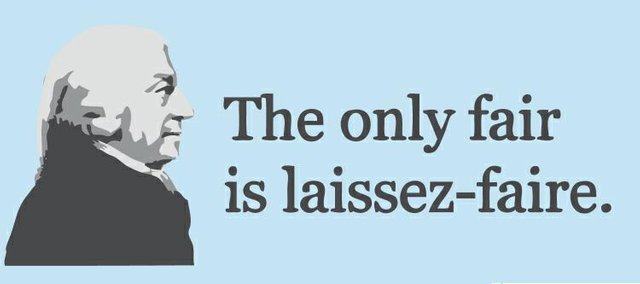
So now you have four definitions of capitalism, three of which would probably not work without a state, and one of which definitely could.
Which definition makes the most sense to you? Do you think capitalism can exist without a state?

Hi, I'm Starr!
I believe all human interactions should be consensual

Let's argue that you took a empty island without any buidlings or government and gave it to capitalists. What would they do with it?
When you talk about a State what you are really talking about is institutions eg the Parliament, Executive, Judiciary, Security/defence, healthcare etc.
So the capitalists build a port, roads and bridges. They run power lines, drains etc.
They draw out plots of land. Operate grocery stores, gas stations, real estate offices, banks, cinemas, bars, whore houses etc
They could do this all without a state. But eventually there would always be the demand for a state. This demand would arise from business elites who want to use the state to their advantage by means of political donations and by members of the public who feel that business elites are taking advantage of them. And all you need is one violent crime eg a murder and people will want to lynch the suspect that is when the demand for a state to enforce public order & justice will be finally complete.
Whether it's a tribal leader or a President there will always be a powerful person this is a fact of nature. Primates often have a leader and it can also be a female. Canines have leaders also bees. This is a recurring theme in nature, humans are no different.
Downvoting a post can decrease pending rewards and make it less visible. Common reasons:
Submit
All of the institutions that are provided by the state (like security, defense, and judiciary) can be provided equally well, or more likely better, by the market. If that were to happen, after a while people would get used to it being that way and I doubt there would be any reason for anyone to demand a state, excepting those who would use the power of the state to steal from and control people.
Downvoting a post can decrease pending rewards and make it less visible. Common reasons:
Submit
Interesting, so the State becomes a corporation?
Downvoting a post can decrease pending rewards and make it less visible. Common reasons:
Submit
No. If a single corporation took on all of the institutions that are currently provided by the state, then that corporation would be a state and we'd be right back where we started.
What I am referring to is competitive markets providing the services that the state currently provides. An individual would never be forced to pay for a service that he or she didn't want or wouldn't use, and people would have choices of service providers. This means that if you are dissatisfied with your current security service provider, for instance, you can stop paying them and choose another provider, or choose not to pay for security at all. Contrast that with the current way of doing things, where the state extracts money from your paycheck to provide a police service whose main job is to extract more money from taxpayers by catching them engaging in victimless crimes like driving without a seatbelt. In a competitive market system, you always have choices and you always have recourse if you are dissatisfied with the services you receive. In a system of state provision of services, you have no choice, no recourse, and one powerful entity has an enormous amount of control over many aspects of your life--and is likely to abuse that power.
Downvoting a post can decrease pending rewards and make it less visible. Common reasons:
Submit
To look at your question up top, "can it exist?" I would have to say absolutely, and using the voluntaryist/libertarian definition.
My followup question is "is that desirable?"
For me, the questions always come up when we include "human psychology" (hereunder — in particular — greed and exploitation) in market forces.
The price of goods and services in a free market exists at the exact intersection of where the most willing seller meets the most demanding buyer. A fine example is a cryptocurrency exchange; just look at the internal market here on Steemit.
There's a tiny sliver where the actual trading happens; but there are tones of people willing to SELL at a higher price and BUY at a lower price. But they are not actually buying or selling anything, they are just "hopeful."
This is the closest we get to the economic theory of "Perfect Competition," which is a beautiful ideology of market efficiency, but tends to fall apart when we introduce human foibles, such as a question have power, or dominate, or amass wealth by sabotaging competitors.
The tendency becomes towards a tiny elite controlling most of the market, and a vast "underclass" that can't afford to participate.
But maybe I am missing something....?
Downvoting a post can decrease pending rewards and make it less visible. Common reasons:
Submit
That kind of stuff happens all the time in state regulated capitalism, and it is usually helped along by the state. (Corporations lobby government to pass laws and regulations that will harm their competitors or keep startups from entering the market; government passes a law that benefits a certain industry by requiring consumers to buy its product; government protects "intellectual property" on drugs and medical devices, creating monopolies in the healthcare market; etc.) So I'm not sure how getting rid of the state would increase the occurrences of this type of thing. If anything, I believe that in the absence of government, capitalism would suffer from far less abuse by the dishonest and power hungry.
Downvoting a post can decrease pending rewards and make it less visible. Common reasons:
Submit
Capitalism existed before any state.
"can I borrow your axe to go kill a mammoth?, and ill return your axe, with some mammoth meat"
"yes"
Capitalism in action.............the rest is smoke and mirrors..
Downvoting a post can decrease pending rewards and make it less visible. Common reasons:
Submit
Good post. To me, there would have to be a mechanism/s which would ensure that there really wasn't coercion and exploitation happening but I'm just a commie bastard...opps, comrade. How does one go about making sure everyone is 'consenting' to any given transaction.
Child labour has been a part of the human condition for some time and our modern mores of saying no to that mode of exploitation is the correct preference, IMO.
One also has to factor in pathology. Psychopaths and sociopaths--scum rises to the top of the pond.
These and many more issues need to be addressed.
Downvoting a post can decrease pending rewards and make it less visible. Common reasons:
Submit
Don't you think that's setting the bar kind of high? It would be impossible under any system to guarantee that no coercion or exploitation was happening anywhere at any time. The most that can be done is to set up a system where honest behavior and respectful treatment of persons is incentivized and/or rewarded, while dishonest behavior, coercion, and exploitation are disincentivized and/or punished. I think a free market does both of those things better than any other system yet devised.
In the absence of a state, one does not go about 'making sure everyone' is doing or not doing anything. That's kind of the point. I do not claim that nothing bad will ever happen in my preferred system of stateless capitalism, or that no one will ever be harmed, or that society-wide problems will never arise. All I am claiming is that there would be less harm and fewer ways for bad people to operate. Again, it goes back to incentives and disincentives.
Child labor has been a part of the human condition for as long as humans have been scuttling along on the crust of this planet, and only in the past eighty years and in very specific minority regions has anyone thought something ought to be done to stop it. Understand that throughout our human history, child labor has been necessary until this particular time, in these particular places. None of our ancestors would have survived if children had not worked. The only reason why it got to the point in western nations that children could go to school or loaf about while the adults did all the work is because those nations amassed so much wealth, so fast, during the industrial revolution. Now that same thing is happening in other regions, particularly China and India. Within a couple of generations the level of prosperity in those regions will have increased to the point where people no longer need their children to work. And then it will happen in other regions, and then others, until the entire world enjoys the kind of wealth that means your kids can go to school and until it is cheaper to buy robots than to employ eight year olds to run the textile machines. That's how that works. There is not currently enough wealth in the world to sustain all of the earth's children and all of its future children without child labor, but as regions build wealth it becomes possible. And if anything, modern states have slowed down and hindered the process.
Exactly. Which is why we shouldn't give them such a convenient vehicle through which to have power over us. Think about it. McDonald's has no power over you. The grocery conglomerate can't force you to shop in its stores. Your local gas station can't extract money out of your paycheck. Amazon can't draft you to fight in a war. It is only possible to do those things on a wide scale and get away with it within the auspices of a government.
Downvoting a post can decrease pending rewards and make it less visible. Common reasons:
Submit
Thanks for the reply,leslie...Time will not allow me to address everything here. And no, I'm not a 'statist' per se. But the nation-state developed side by side to modern economies and is very much like a virus and in that sense, it will be near impossible to eradicate. Having said that, I don't think it's 'the state' in any normative sense that is the issue today. The state is now CORPORATE OLIGOPOLY run via a transnational plutocracy of about 1000 billionaires! So these guys are the 'state' now so I'm not sure ANCAPS have their arrows pointed at the right target. The mode these billionaires use is a mafia ethos and they've co-opted the state via violence and cultural propaganda instantiated by Wall St. mechanisms (see Bernays et al)... I'm of the opinion that it's a fallacy to assert that a 'state' has to be toxic...
But the toxicity in modernity is enmeshed via the banking cartels so it's a bloody mess that's intractable and I'm not convinced by Mises, Hyack or any other alt.-right thinkers who espouse that the 'market' has the solutions. I call such thinking 'Casper Economics'...The free hand and all. But in an overarching sense, I'm still much more for you than against.
I'm what's called a spiritual Gnostic so we may part ways there although politically we are fighting (anarchy) the same archons even if you don't buy 'who they really are.'
Downvoting a post can decrease pending rewards and make it less visible. Common reasons:
Submit
If a thousand billionaires, out of all the hundreds of millions of capitalists in the world, have become the state, then it hardly seems like capitalism itself is the problem. And I agree with you that this has occurred. Where we differ is that I think the state was custom designed, from its very beginnings, to be run by the worst people with the worst motives. As you said, the scum rises to the top. In times past it was entitled royalty; under state communism it's the Party; in the modern industrialized world it's corporate oligarchy. Either way, the state itself is the vehicle (the only vehicle) that can be used by a small group of psychopaths to control entire populations of people. Rulers have generationally tricked us into consenting to be ruled, and it's going to take a lot of deconditioning to ever break out of those shackles. And I do think states are necessarily toxic, because in order to function, they must violate the core rule of morality, which is to not initiate force. No other type of human institution necessarily violates that rule. Not businesses, not churches, not neighborhood covenants; nothing except the state.
Thanks for your comments. I appreciate the discussion.
Downvoting a post can decrease pending rewards and make it less visible. Common reasons:
Submit
when immigrants enter the country ILLEGALLY seeking to take advantage of the free trade to better their own lots in life.
conservatives do not think that job exportation or immigration are bad for the economy. They think illegal immigration is bad. And this is because it is bad not only for legal workers it is bad for the illegal immigrants, they are often exploited because they don't enjoy or perceive that they enjoy the full protection of the state.
Downvoting a post can decrease pending rewards and make it less visible. Common reasons:
Submit
You are right that conservatives think illegal immigration is bad, not all immigration. I should have clarified.
I disagree. Again, just like how black markets wouldn't be dangerous, expensive and inefficient if the state didn't prohibit them, I don't think immigration that is currently deemed by the state to be "illegal" would be nearly as dangerous or risky for the immigrants themselves if the state didn't prohibit it. As far as the negative effects of illegal immigration on legal workers, they are mostly either imagined or balanced out by positives effects that immigration (even the illegal sort) brings to the economy of the host country.
Downvoting a post can decrease pending rewards and make it less visible. Common reasons:
Submit
If the state didn't prohibit them they would not be black markets by definition. In the absence of any regulation markets are dangerous, expensive and inefficient. You need to be able to have standardized weights and measures and the ability to sue people when they fail to fulfill their contractual obligations to be able to do business efficiently. You need a disincentive to settle things with violence. The state provides all of that and those things make doing business much easier and profitable.
If the state didn't prohibit illegal immigration they would not be much of a state, the positive effects to the economy of having second class workers that can be exploited because they don't enjoy the protection of the state are worth allowing that?
Slavery is great for the economy. This country was built upon that fact.
Downvoting a post can decrease pending rewards and make it less visible. Common reasons:
Submit
Nice explanation post (even, as often, the Marx part is nor really on point, especially about the investment).
Anyway, you could of course have made it shorter.
Under the headline, just write: Read Shadowrun
Downvoting a post can decrease pending rewards and make it less visible. Common reasons:
Submit
good job.....
Downvoting a post can decrease pending rewards and make it less visible. Common reasons:
Submit
Please Stop - @mokles
You just said "good job" and in your your last 100 comments you used 32 phrases considered to be spam and you made this exact same comment 1 times. You've received 1 flags and you may see more on comments like these. These comments are the reason why your Steem Sincerity API classification scores are Spam: 77.90% and Bot: 7.70%
Please stop making comments like this and read the ways to avoid @pleasestop and earn the support of the community.
Downvoting a post can decrease pending rewards and make it less visible. Common reasons:
Submit
yeah, that is exactly right, it would make all markets like the black market now: inefficient expensive and dangerous.
Buying a bag of rice would be as sketchy as buying a bag of crack.
Downvoting a post can decrease pending rewards and make it less visible. Common reasons:
Submit
Funny, I don't feel unsafe or sketchy when I buy from people on Craigslist. Sure there are some sketchballs on there, but you use common sense precautions like meeting at a public place and not allowing them to pay with a cashier's check. That's more what I was referring to when I said "beneath the notice of the modern state", but since you took it to black markets, yes, that exists too. And the reason why they are so dangerous, inefficient, and expensive is because they are illegal. Remove state prohibition and black markets are no longer "black".
Downvoting a post can decrease pending rewards and make it less visible. Common reasons:
Submit
So you have somehow missed the news about all the murders, rapes and robberies facilitated by craigslist? And the warnings that Craigslist itself provides? Craigslist does not provide those warnings for no reason.
Sure that helps, why are you doing any of those things if you don't feel unsafe or sketchy? do you ever have to worry about Walmart raping and robbing you? Have you ever tried to return something that you bought on craigslist?
Craigslist is a great example of the dangers and inefficiencies that exist in the absence of regulation, and it does not exist in the absence of regulation! All of the rules still apply to craigslist, you still have the police protecting you, because of that there are fewer rapes, robberies and murders from craigslist than their would be without them. And you still enjoy the protections of the court and state, you can sue someone who rips you off on craigslist. Without that there would be even more rip offs.
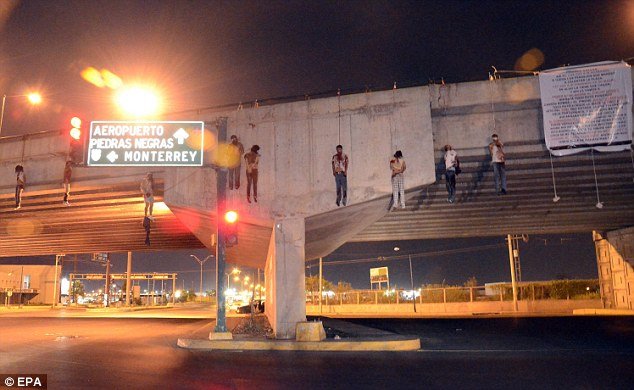
Without the protection of the state every market would be like the illegal methamphetamine market. And of course some sort of dominant protection agency would arise to fill the vacuum of power. We see this in black markets with drug cartels, when the state abdicates its regulatory responsibility another protection agency will take over, except they don't usually fine people who violate their regulations, they do this:
I was thinking about craigslist last night and I made a decision to no longer use it because it has caused me nothing but headaches over the last year, it's more trouble than it is worth.
Downvoting a post can decrease pending rewards and make it less visible. Common reasons:
Submit
Same reason I lock my car when I go into Walmart. Not because I feel unsafe, but just out of a common sense habit of reducing opportunities for others to do me harm.
So people never get ripped off by businesses in regulated industries? Healthcare is one of the most regulated industries in existence, and yet there are tons of stories about people being lied to, overcharged, or even abused at the hands of medical professionals. Regulation does not stop assholes from being assholes. As a consumer, you have to take measures to protect yourself regardless of whether you are purchasing goods and services from licensed, regulated providers or from some guy at the flea market.
The police have nothing to do with the rate of Craigslist transactions that end in rape or murder (which is extremely low, by the way.) In the vast majority of cases, there is nothing the police can do to stop a crime in progress. All they can do is come around after the fact and tag the body. Again, whether there are police around or not, it is incumbent upon the individual to protect him or herself from criminals. 95% of protecting yourself is common sense precautions, 4% is knowing some self defense, and 1% is chance. The ability of the police to intervene on your behalf falls into that last 1%.
There is no reason why court arbitration services and security services such as are currently provided (badly) by the state couldn't also be provided by a competitive market.
The methamphetamine market is the way it is because the state has regulated it. Black markets are the most regulated markets in existence, not the least. They have been regulated to the extent that no one is allowed to participate in them. For those who choose to ignore that regulation, there are high profits to be had because of the risk involved. If recreational methamphetamines were not made illegal by the state, they would be manufactured in state of the art labs, sold in brick and mortar stores. Prohibition creates danger and criminality in a market, not the other way around. Think of alcohol prohibition in the U.S. as a perfect example.
Downvoting a post can decrease pending rewards and make it less visible. Common reasons:
Submit
in general regulations are aimed at "reducing opportunities for others to do me harm." and also providing non violent forms of recourse when they do.
Do you really have to take the same measures in both cases? Do you worry about meeting in public and bad checks when you do business with regulated sellers?
I'm sure I never made that claim. When they do regulations provide you recourse, you hear all those stories because people get busted and/or sued breaking the regulations. The American health industry provides a great example of how government subsidies lead to all sorts of market failures, that's a whole different discussion.
"The police have nothing to do with the rate of Craigslist transactions that end in rape or murder "
I disagree, when they bust a serial craigslist murderer or rapist they prevent those people from raping and murdering more craigslist users. That reduces the rate of craigslist rapes and murders. Without the police those people would continue to rape and murder craigslist users. The police also warn people about craigslist rapists murderers, robbers and scammers who are still on the loose which has to help as well. I am sure I never said that the main benefit of the police would be stopping crimes in progress. You really think there is zero deterrent effect from police and courts? I sure would hurt a lot more people without the threat of legal sanctions. I sure would have been ripped off more without the threat of taking people to court. Without courts what recourse is there?
"There is no reason why court arbitration services and security services such as are currently provided (badly) by the state couldn't also be provided by a competitive market."
There is and this is where anarchists often go into denial, the only reason anyone ever agrees to arbitration is because otherwise they would have to go to court and there are costs associated with that. Without the threat of court why would anyone agree to participate in your arbitration?
As far as competing security services we have many real life examples of that. We can see how that goes in real life anywhere the state has failed in its role as dominant protection agency. These "security services" are called cartels, street gangs and the mafia depending where you are at. That is the reality of life without a properly functioning dominant protection agency.
Prohibition is the abdication of regulation.
Downvoting a post can decrease pending rewards and make it less visible. Common reasons:
Submit
Spot on discussion!
Downvoting a post can decrease pending rewards and make it less visible. Common reasons:
Submit
Nice job.
Good blog....
Downvoting a post can decrease pending rewards and make it less visible. Common reasons:
Submit
While I agree the state is non-essential to the capitalist system, its absence would not make capitalism apolitical. The natural rights of life, liberty and property---the building blocks of politics---are implicit in voluntary relationships of any kind, including your would-be apolitical economic system.
Likewise, an ethics of rationality and self interest, an epistemology of reason and logic, and a metaphysics of a stable and knowable reality underlie economic freedom.
Unfortunately, this is a perfect example of libertarian shallowness. Try as you might, there will never be an economic escape for libertarians from the imperative of philosophy.
Downvoting a post can decrease pending rewards and make it less visible. Common reasons:
Submit
I don't recall ever saying that capitalism would or should be apolitical in the absence of a state. Politics can occur in private contexts as well as public. Competition between market actors can take the shape of politics.
Beyond that, I'm not sure what the point of your comment is.
Downvoting a post can decrease pending rewards and make it less visible. Common reasons:
Submit
"In this view, capitalism is purely and simply: an economic system..."
That warned me. Then one paragraph later came this:
"...we do not view capitalism as a political-economic system, but just as an economic system."
Amidst this, you talk about owners and consent, both political ideas. It's a major contradiction.
As for your not understanding, the libertarian tendency to not understand things is just my point. I write primarily for myself as an exercise and for anyone else trying to understand, now or in the future.
Downvoting a post can decrease pending rewards and make it less visible. Common reasons:
Submit
There’s a difference between a political system and a system that has political aspects. since you said you agree that capitalism can exist without a state, that would mean it isn’t a political system as commonly defined. So what definition of “political” are you operating under?
Downvoting a post can decrease pending rewards and make it less visible. Common reasons:
Submit